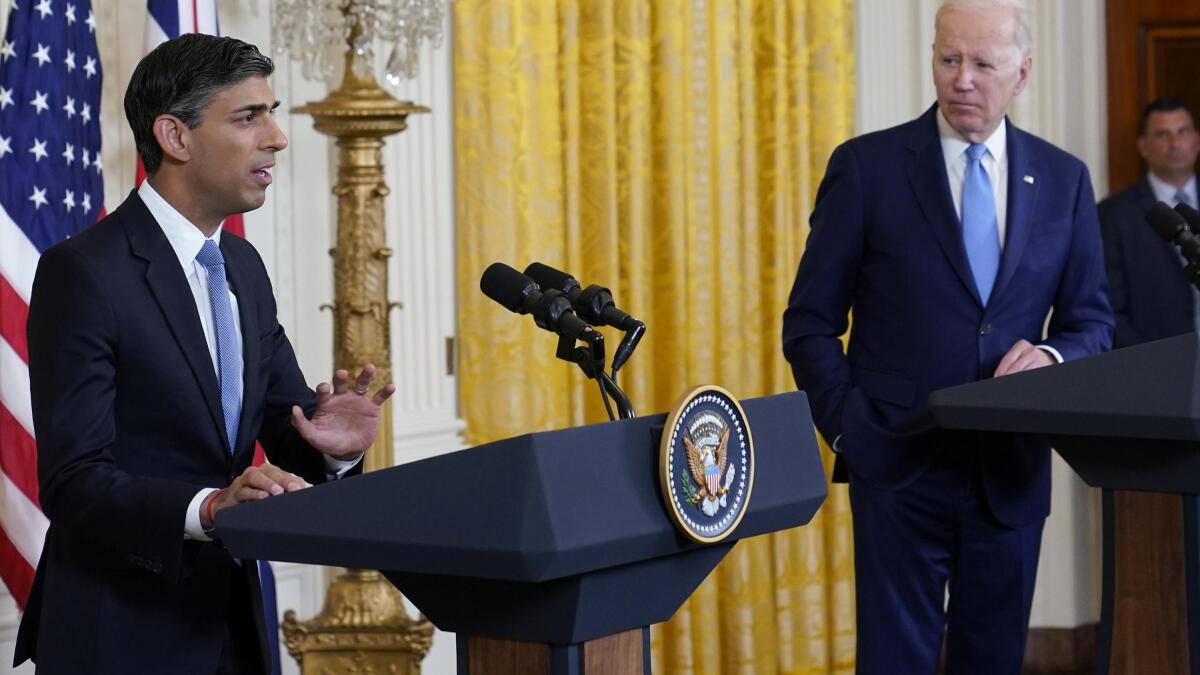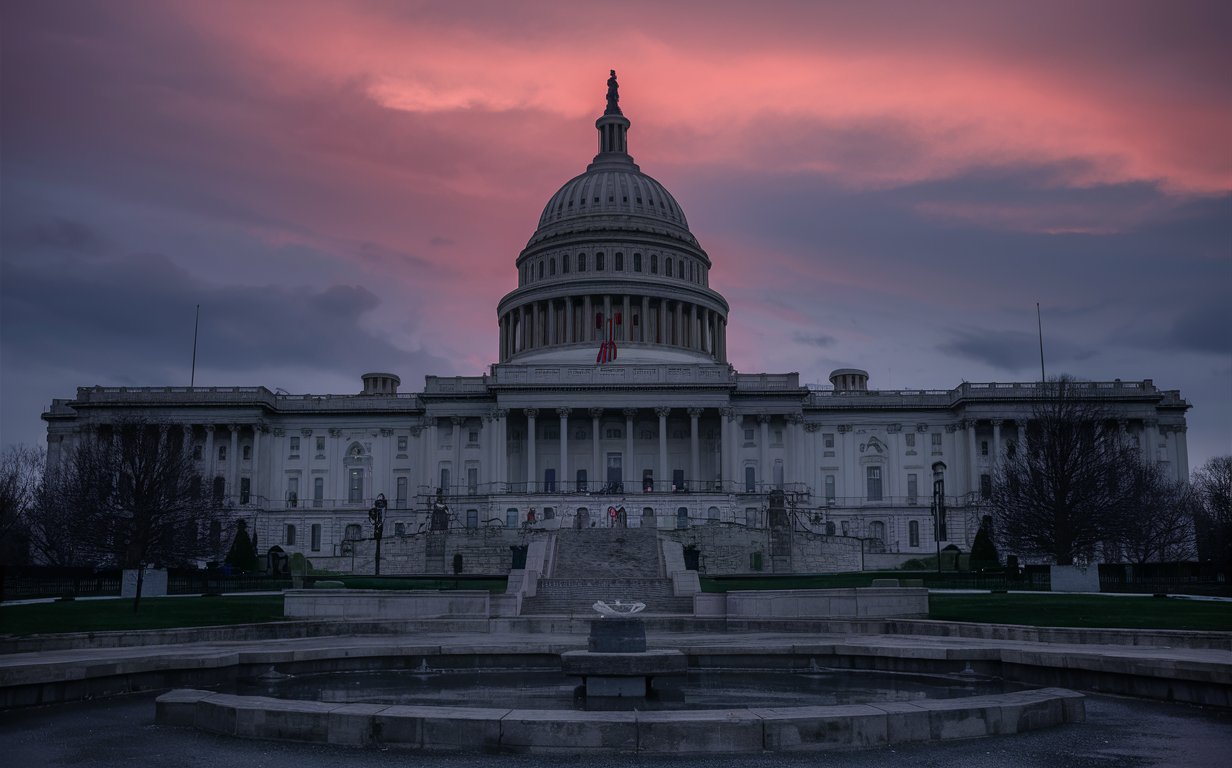Diplomacy
President Biden’s Meeting with UK PM Rishi Sunak: NATO and Beyond

Table of Contents
Introduction
In a significant diplomatic move, President Joe Biden of the United States met with Prime Minister Rishi Sunak of the United Kingdom to discuss various matters, including the role of NATO and other important issues. This historic meeting aimed to strengthen the relationship between the two nations and address common challenges faced by the international community. In this article, we will delve into the details of their meeting, the significance of NATO, and the outcomes of their discussions.

1. Meeting Overview
President Joe Biden and Prime Minister Rishi Sunak held a bilateral meeting to discuss a wide range of issues of mutual interest and concern. The meeting took place in a friendly and cordial atmosphere, emphasizing the strong ties between the United States and the United Kingdom.
2. Importance of the U.S.-UK Relationship
The United States and the United Kingdom share a special relationship that is rooted in history, common values, and shared goals. Both nations have a long-standing commitment to democracy, human rights, and the rule of law. The meeting between President Biden and Prime Minister Sunak aimed to further strengthen this relationship and deepen cooperation on various fronts.
3. Understanding NATO
NATO, the North Atlantic Treaty Organization, is an intergovernmental military alliance comprising 30 member countries from Europe and North America. Its primary purpose is to ensure the collective defence and security of its members through political and military cooperation.
4. NATO’s Evolution
Since its establishment in 1949, NATO has evolved to adapt to the changing global security landscape. It has expanded its membership, developed new capabilities, and taken on additional roles beyond collective defence. The alliance has become a vital forum for political consultations, cooperation, and crisis management.
5. Challenges Faced by NATO
In recent years, NATO has faced various challenges, including geopolitical shifts, emerging security threats, and changes in technology. These challenges require NATO to adapt and respond effectively to ensure its continued relevance and effectiveness.
6. Discussion on NATO’s Future
During their meeting, President Biden and Prime Minister Sunak discussed the future of NATO and ways to strengthen the alliance. They emphasized the importance of collective defense, deterrence, and cohesion among member nations. Both leaders expressed their commitment to investing in NATO’s capabilities and modernizing its structures.
7. Cooperation on Climate Change
Recognizing the urgency of addressing climate change, President Biden and Prime Minister Sunak discussed the importance of international cooperation to combat this global challenge. They explored ways to collaborate on renewable energy, green technologies, and sustainable development to reduce carbon emissions and mitigate the impacts of climate change.
8. Economic Partnerships
Enhancing economic partnerships between the United States and the United Kingdom was a key focus of the meeting. President Biden and Prime Minister Sunak discussed opportunities for trade and investment, promoting innovation and entrepreneurship, and fostering economic growth in both nations.
9. Security Cooperation
Given the evolving security landscape, President Biden and Prime Minister Sunak reaffirmed their commitment to deepening security cooperation. They discussed joint efforts to counter terrorism, strengthen cybersecurity, and combat transnational organized crime. The leaders also emphasized the importance of intelligence sharing and collaboration in addressing common security challenges.
10. Addressing Global Health Issues
The COVID-19 pandemic highlighted the importance of global health cooperation. President Biden and Prime Minister Sunak discussed strategies to enhance preparedness for future pandemics, strengthen healthcare systems, and ensure equitable access to vaccines and healthcare services.
11. Promoting Democracy and Human Rights
President Biden and Prime Minister Sunak reiterated their commitment to promoting democracy, human rights, and the rule of law worldwide. They discussed ways to support democratic institutions, protect human rights, and counter authoritarianism and disinformation.
12. Technological Collaboration
Recognizing the transformative power of technology, President Biden and Prime Minister Sunak emphasized the need for close technological collaboration. They discussed areas such as artificial intelligence, quantum computing, and 5G networks, and explored opportunities for joint research, innovation, and regulation.
13. Cybersecurity and Digital Infrastructure
The leaders acknowledged the growing importance of cybersecurity and the need to protect critical digital infrastructure. They discussed the challenges posed by cyber threats and the importance of robust cybersecurity measures to safeguard national and international interests.
14. Conclusion
The meeting between President Joe Biden and Prime Minister Rishi Sunak marked a significant step in strengthening the relationship between the United States and the United Kingdom. Their discussions on NATO, climate change, economic partnerships, security cooperation, global health, democracy, human rights, technology, and cybersecurity showcased the commitment of both nations to addressing shared challenges and promoting international peace and prosperity.
FAQs
- What is the purpose of NATO? NATO’s primary purpose is to ensure the collective defence and security of its member countries through political and military cooperation.
- What are the challenges faced by NATO? NATO faces challenges such as geopolitical shifts, emerging security threats, and changes in technology that require adaptation and response.
- What did President Biden and Prime Minister Sunak discuss regarding climate change? They discussed the importance of international cooperation on renewable energy, green technologies, and sustainable development to combat climate change.
- What areas of technological collaboration did President Biden and Prime Minister Sunak discuss? They explored collaboration in artificial intelligence, quantum computing, and 5G networks, among other areas of technology.
- How did the meeting between President Biden and Prime Minister Sunak contribute to strengthening the U.S.-UK relationship? The meeting emphasized the shared values, goals, and commitment between the two nations, fostering closer ties and cooperation on various fronts.
In conclusion, President Joe Biden’s meeting with Prime Minister Rishi Sunak of the United Kingdom highlighted the importance of international collaboration and addressed significant matters such as NATO, climate change, economic partnerships, security cooperation, global health, democracy, human rights, technology, and cybersecurity. This meeting served as a platform to strengthen the relationship between the United States and the United Kingdom, promoting mutual understanding and cooperation on common challenges faced by the international community.
Analysis
The Impending Storm: Iran’s Concerns Over a Second Trump Presidency

Table of Contents
Introduction
As the political landscape in the United States evolves, the spectre of a second term for Donald Trump looms large, casting a shadow of uncertainty over international relations. For Iran, this potential scenario brings forth a myriad of concerns, ranging from economic shocks to heightened military tensions and the risk of widespread unrest. In this article, we delve into the reasons why Iran is apprehensive about the prospect of Donald Trump reclaiming the presidency, examining the implications for the country’s leadership amidst a backdrop of escalating regional conflicts.

Economic Implications
Iran’s economy has been significantly impacted by the Trump administration’s policies, particularly through the re-imposition of sanctions following the U.S. withdrawal from the Iran nuclear deal. A second Trump presidency could exacerbate these economic challenges, leading to further isolation and financial strain for Iran. The uncertainty surrounding future trade agreements and the potential for increased sanctions under a renewed Trump administration create a climate of instability that could have far-reaching consequences for Iran’s economy.
Military Escalation
One of the most pressing concerns for Iran is the possibility of bolder military action by the United States under a second Trump presidency. The recent tit-for-tat strikes with Israel and the looming threat of a wider conflict in the Middle East underscore the precarious nature of regional security. With Trump’s track record of aggressive foreign policy decisions, Iran faces the prospect of heightened military tensions and the risk of direct confrontation with the U.S. and its allies.
Impact on Leadership
The risks posed by a second Trump presidency extend beyond economic and military considerations to the very core of Iran’s leadership. The current regime faces the challenge of navigating a complex geopolitical landscape, where the actions of the U.S. can have profound implications for domestic stability. Increased protest movements, fueled by discontent over economic hardships and political repression, could further destabilize Iran’s leadership and exacerbate internal divisions.
Conclusion
In conclusion, the potential re-election of Donald Trump as U.S. president presents a formidable set of challenges for Iran, encompassing economic uncertainty, military escalation, and internal unrest. The implications of a second Trump presidency for Iran’s leadership are profound, requiring a strategic approach to navigate the complexities of international relations and safeguard the country’s interests. As Iran prepares for an uncertain future, the spectre of a second Trump presidency looms large, casting a shadow of apprehension over the nation’s political landscape.
China
Unveiling the Enigma: Why Did China’s Ousted Foreign Minister Qin Gang Step Down as Lawmaker? Exploring the Intricacies of His Departure

Introduction
In a recent development that has sparked widespread interest and speculation, Qin Gang, China’s former Foreign Minister, has stepped down as a lawmaker. This move comes in the wake of his removal from the foreign ministry, raising questions about the reasons behind his departure from both positions. Let’s delve into the intricacies of this significant event and explore its implications.
Who is Qin Gang?
Qin Gang’s Background and Career Trajectory:
Qin Gang is a seasoned diplomat who has held various prominent positions within the Chinese government. His career spans decades, during which he has been involved in shaping China’s foreign policy and representing the country on the global stage. As a trusted aide to President Xi Jinping, Qin Gang’s influence extended beyond his role as Foreign Minister.
The Ousting of Qin Gang:
Reasons Behind Qin Gang’s Removal as Foreign Minister:
Qin Gang’s tenure as Foreign Minister was marked by both successes and controversies. His diplomatic approach and handling of key international issues drew mixed reactions, leading to speculation about internal power struggles within the Chinese leadership. The decision to remove him from his position sent shockwaves through diplomatic circles and raised questions about the direction of China’s foreign policy.
Qin Gang’s Transition to Lawmaking:
Qin Gang’s Appointment as a Lawmaker:
Following his removal as Foreign Minister, Qin Gang was appointed as a lawmaker in China’s legislative body. This move was seen as a strategic decision to maintain his influence within the political system despite his exit from the foreign ministry. However, his resignation from this position has added another layer of complexity to his political trajectory.
Factors Influencing Qin Gang’s Resignation:
Internal Politics and Power Dynamics:
The intricate web of political dynamics within the Chinese government likely played a significant role in Qin Gang’s decision to step down as a lawmaker. Speculations abound regarding potential conflicts of interest, disagreements with key figures, or shifts in policy priorities that may have prompted his departure. Understanding these internal factors is crucial to grasping the full context of his resignation.
Implications for China’s Foreign Policy:
Impact on China’s Diplomatic Relations:
Qin Gang’s departure from both the foreign ministry and his lawmaker position is expected to have ripple effects on China’s diplomatic engagements. His successor in the foreign ministry will inherit a complex landscape shaped by Qin Gang’s tenure, requiring adept navigation of existing relationships and potential challenges. Observers are closely monitoring how this transition will impact China’s stance on key global issues.
Conclusion:
The resignation of Qin Gang as a lawmaker following his removal as Foreign Minister marks a significant chapter in Chinese politics and diplomacy. The reasons behind his departure, the internal dynamics at play, and the implications for China’s foreign policy all contribute to a nuanced understanding of this event. As we continue to analyze these developments, one thing remains clear: Qin Gang’s exit has far-reaching consequences that will shape China’s future trajectory on the world stage.
Diplomacy
Navigating Diplomacy with Donald Trump: A European Perspective

Table of Contents
Introduction
As we navigate through the complexities of global politics in this post-Trump era, it’s essential to reflect upon how Europe approached negotiations during his presidency. This thoughtful analysis will delve into strategies that could have been more effective when dealing with former President Donald J. Trump, offering insights from both historical context and contemporary perspectives.
Understanding the Context
To comprehend the challenges faced by European leaders while interacting with Trump, one must first grasp the unique nature of his administration. His unconventional approach to diplomacy often involved personal attacks, blunt language, and an apparent disregard for established norms. As such, traditional methods of negotiation were frequently met with resistance or outright rejection.
Key Considerations for Effective Negotiations
In order to achieve successful outcomes, European leaders would do well to consider several key factors:
- Emphasize shared values: Highlight areas where common ground exists between the U.S. and Europe, focusing on democratic principles, the rule of law, and respect for international institutions.
- Be proactive: Anticipate potential obstacles and develop preemptive solutions rather than reactively responding to provocations.
- Maintain consistency: Maintain a cohesive front among member states, avoiding internal divisions that might undermine collective bargaining power.
- Communicate effectively: Utilize clear, concise messaging that is easily understood by all parties, minimizing misunderstandings and misinterpretations.
- Adapt to changing circumstances: Be prepared to adjust tactics as needed based on new information, shifting priorities, or evolving political landscapes.
Lessons Learned from Past Interactions
European leaders encountered numerous difficulties throughout their interactions with Trump. Some notable examples include:
- The Paris Climate Agreement: Despite strong support from European nations, Trump announced the United States’ withdrawal from the agreement, citing economic concerns.
- Transatlantic Trade Relationship: Tensions rose over trade tariffs imposed by Trump, which threatened to disrupt long-established trading relationships.
- Russia Sanctions: Disputes emerged regarding sanctions against Russia, with Trump expressing scepticism about their effectiveness.
These instances highlight the need for European leaders to adapt their approaches to better accommodate Trump’s idiosyncratic style of leadership.
Strategies for Successful Engagement
Based on these lessons learned, European leaders can implement the following strategies to improve their engagement with future American administrations:
- Focus on mutual benefits: Emphasize win-win scenarios that benefit both sides, thereby reducing the likelihood of confrontational exchanges.
- Promote transparency: Encourage open communication channels and regular dialogue, fostering trust and understanding between parties.
- Stay informed: Keep abreast of current events and developments within the U.S., enabling European leaders to anticipate shifts in policy and respond accordingly.
- Build coalitions: Collaborate with like-minded countries to strengthen collective bargaining positions and amplify voices advocating for shared interests.
By implementing these strategies, European leaders may find themselves better equipped to handle challenging situations and foster constructive dialogues with future American presidents.
Conclusion
While navigating the intricacies of diplomacy with Donald Trump proved difficult at times, European leaders can learn valuable lessons from those experiences. By adopting a strategic, proactive, and collaborative approach, they stand a greater chance of achieving mutually beneficial outcomes in their dealings with future American administrations. Ultimately, maintaining a strong relationship with the United States remains crucial for ensuring peace, stability, and prosperity across the globe.
-

 Featured3 years ago
Featured3 years agoThe Right-Wing Politics in United States & The Capitol Hill Mayhem
-

 Elections 20242 months ago
Elections 20242 months agoAnalyzing Trump’s Super Tuesday Triumph and Nikki Haley’s Strategic Moves
-

 News2 years ago
News2 years agoPrioritizing health & education most effective way to improve socio-economic status: President
-

 China3 years ago
China3 years agoCoronavirus Pandemic and Global Response
-

 Canada3 years ago
Canada3 years agoSocio-Economic Implications of Canadian Border Closure With U.S
-

 Conflict3 years ago
Conflict3 years agoKashmir Lockdown, UNGA & Thereafter
-

 Democracy3 years ago
Democracy3 years agoMissing You! SPSC
-

 Democracy3 years ago
Democracy3 years agoPresident Dr Arif Alvi Confers Civil Awards on Independence Day























